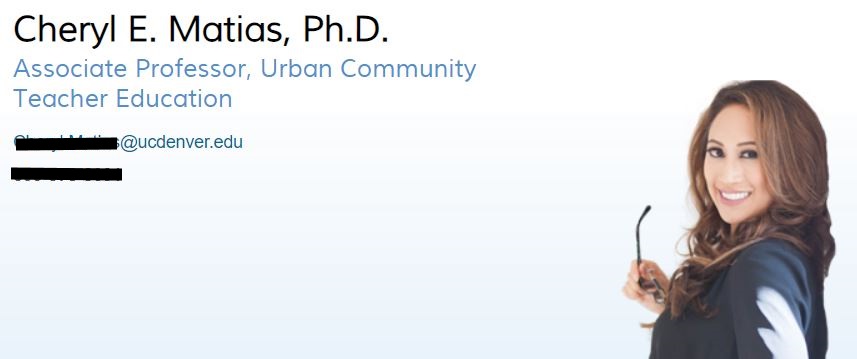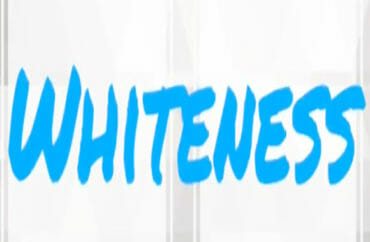CU Denver ethnic studies class: ‘educating for racial justice’
In March, I wrote on the “American Political Thought” course offered by the political science department at the University of Colorado Denver that deliberately removed all white males and their contributions from the curriculum, instead focusing on “voices from the margins.”
The trend of anti-white “wokeness” at CU Denver continued this semester. This spring, its ethnic studies department offered a course called “Problematizing Whiteness: Educating for Racial Justice.”
The syllabus, a copy of which was obtained by The College Fix, spells out its details.
“The study of whiteness has always sought to challenge racism, racial privilege, white supremacy, and colorblind racism. However, to overindulge in the spectacle of ‘white racial epiphanies’ overlooks the ongoing work whites must do to participate in racial justice,” it states. “Beyond the feel-good of momentary White racial awareness lurk enormous concerns about how to continually examine Whiteness in order to uphold antiracism, moreover the fruition of a more racially just society.”

Its instructor, Associate Professor Cheryl Matias, said in an email to The College Fix that whiteness is a term often misunderstood.
“Whiteness is not about culture or white skin as your question presumes,” said Matias, who includes in her email signature the moniker “Motherscholar.”
Asked what kind of prospective career path her course prepares students for, Matias said: “Any job that respects diversity and people.”
With regard to the charge that Matias’s course only further provokes racial divides in society, she responded: “Before judging a book by its cover, they should take the course and learn first.”

According to the syllabus, during “Problematizing Whiteness,” one of the essential objectives is for students to understand “whiteness” is not restricted to actually being a white-skinned person, and instead it is a set of beliefs, characteristics, values and norms that determine somebody’s “whiteness.”
This is echoed in the course readings, which includes such texts as “White Privilege: Essential Readings on the Other Side of Racism,” “Black Bodies, White Gazes,” “White Out: The Continuing Significance of Racism” and “Handbook of Social Justice in Education.”
In addition, some of the required items of reading are Professor Matias’s own work, which includes publications such as:
“And our Feelings Just Don’t Feel it Anymore”: Re-Feeling Whiteness, Resistance, and Emotionality.
Loving whiteness to death: Sadomasochism, Emotionality, and the Possibility of Humanizing Love.
White Skin, Black Friend: A Fanonian Application to Theorize Racial Fetish in Teacher Education.
“Why do you make me hate myself?”:Re-teaching Whiteness, Abuse, and Love in Urban Teacher Education.
On the “Flip” Side: A Teacher Educator of Color Unveiling the Dangerous Minds of White Teacher Candidates.
The syllabus is from 2016 but Matias declined an opportunity to spell out to The College Fix any updates or changes it has undergone in recent years.
The course’s three essential questions listed in the syllabus are: “What is whiteness?” (Where does it come from? What does it do to us?); “How do I identify whiteness in the self and society?” (What does it look, feel, or sound like?); and “What do we do about whiteness?”
To put the questions into academic practice, students are given four major assignments. The first is called “Getting Down and Dirty with Whiteness,” in which students are asked to take what they’ve learned in the course readings and lectures and describe how it applies to the world around them.
The second assignment, “Deconstructing Whiteness in the Self and/or Society,” tasks students with finding whiteness in media. “In this presentation, you are to use the literature, lectures, and class discussions from the course to unveil how Whiteness and race covertly operates. Meaning, what is the subliminal message being sent about whiteness, white culture, and people of color?”
The third assignment, “Doing something about it: Racial Justice Advocacy,” requires the student to be – quite literally – an activist for racial justice.
“There is a moral and ethical dilemma when learning about whiteness and race. If one is to learn about the racial injustices of society they must, in good faith, engage in processes that enact racial justice. That is, although education should be free, learning comes at a price: that price is doing something that benefits the community with that knowledge,” the syllabus states.
Students can take on projects such as to launch a blog to “push the conversation of race beyond mere comfort levels or white fragility” or “create a plan of action on how to disseminate the knowledge of whiteness in other departments, organization, communities, etc.”
The fourth assignment — “Are you truly feelin’ it?” — is effectively an overall grade for a student’s “emotional commitment” to the course, the syllabus states.
Supplementary course material includes a chart on how to deconstruct common arguments of “examples of whiteness all around us.”
Another is a flowchart titled “Operations of Power in Institutionalized White Supremacy.” The flowchart has two columns: how white supremacy impacts whites and how white supremacy impacts people of color.
 “Elements of whiteness” listed include: investment, privilege, naturalization, identity, emotionalities, colorblindness, wealth, victimization in reverse racism rhetoric and authority.
“Elements of whiteness” listed include: investment, privilege, naturalization, identity, emotionalities, colorblindness, wealth, victimization in reverse racism rhetoric and authority.
Items it suggests are “dynamics of racism” include: racial microaggression, Eurocentrism, job discrimination, achievement gap, model minority and “submission of docile body.”
In the center, there is a short list of ways in which “whiteness” can impact people of color: internalized racism, self hate, inferiority complex, dependency, color blindness and denial and adopting white emotions.
In addition to the problematic –and frankly, racist – content of the course, which demonizes whites and “whiteness,” it has effectively redefined the term whiteness to not only limit itself to white people, but to anybody who thinks, acts and speaks “white.” Guilty by association is anybody who believes in the ideas and follows the traditions of Western Civilization.
By vilifying “whiteness,” this course reduces students and individuals to their skin colors — not their minds that can think with free agency, or their hands that can work and build and create.
Indeed, it perpetuates the bigoted idea that if you’re a person of color, you are the wrong kind of person of color if, for instance, you think for yourself or come to your own conclusions.
What’s more, let’s replace the word “white” or “whiteness” with, say, “blackness,” or “Mexican-ness” or, in my case, “Bangladeshi-ness.” Imagine the (rightful) outcry if modes of thought, lifestyles, social and political views, and modes of behavior were simply dismissed as traits of “blackness” – even when they’re not exhibited by individuals who are black.
Meanwhile, Dr. Matias’s history of anti-white division goes beyond her published academic work and course at CU Denver. She helped lead a racial “healing circle” at San Diego State in March. In one of her past scholarly articles, she called whiteness a “disease.”
For all this, she has been praised. Matias is a two-time recipient of CU Denver’s “Rosa Parks Diversity Award,” the recipient of an award from the American Medical Research Association, and was listed in the journal Diverse: Issues in Higher Education as one of its Top 25 Women in Higher Education. In December, the popular Denver magazine 5280 wrote a glowing article about Matias headlined “How to be a True Anti-Racist.”
“At the end of the day, the one thing that all people can get by learning about racial identities is that you can feel like a human,” Matias told the magazine. “You feel like, ‘Wow, I’m connected.’ We’re sharing a burden as a common humanity. It’s not about not seeing race—not that. It’s understanding and seeing how race impacts the humanity of all of us.”
But these platitudes do not negate the reality of this course.
If this is the new trajectory of CU Denver – one which devalues the contributions of white men in an American Political Thought class and one which teaches students to “problematize” whiteness in the ethnic studies program, then the school will have only itself to blame for disenfranchising such a large student demographic who no longer feel welcome.
But as it currently happens on campuses, ideas are being sacrificed in favor of identities, victimhood has replaced merit and virtue, and the pragmatists of the old guard are left at the mercy of the woke brigade.
MORE: Notre Dame event: Whiteness is an ‘oppressive political condition’
IMAGE: Shutterstock


